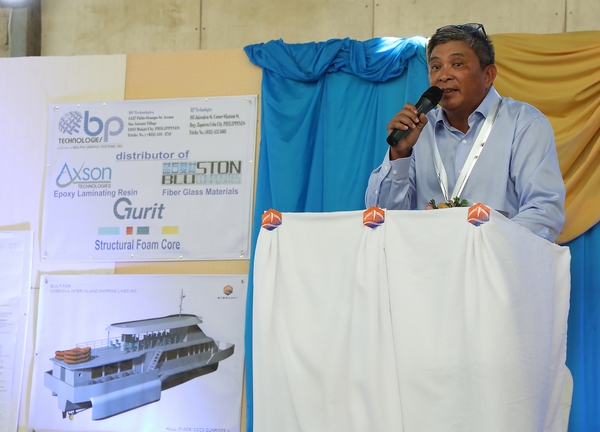Shipbuilding firm to set up P500-M manufacturing facility

Andrew Aznar, Evercat Asia Inc. chairman, discusses the shipbuilding company’s latest project — an order to build a fiber-reinforced plastic passenger vessel, which will eventually ply the Bohol-Cebu shipping route. The firm announced the deal last Tuesday during a press briefing in Lapu-Lapu City. CDN PHOTO/TONEE DESPOJO
Growing non-wooden hull passenger vessels’ market eyed
A shipbuilding company that specializes in building innovative sea vessels plans to put up a 2-hectare manufacturing facility to serve the projected demand for non-wooden hull passenger vessels.
Andrew Aznar, chairman of the board of Evercat Asia Inc., said the phase-out of wooden hulled passenger boats in the Philippines is expected to create a demand for vessels using innovative materials.
According to Aznar, this facility would require an initial investment of around P100 million but the total investment would require at least P500 million.
He explained that their company is a registered ecozone enterprise so their access to the domestic market would be limited.
By opening a facility outside the Mactan Economic Zone, an affiliate company would be able to tap the growing demand for non-wooden hull passenger vessels.
Because of this, Aznar reveals that Evercat will establish a manufacturing facility in Cebu where they could build passenger vessels made from fiberglass reinforced plastics (FRP), also known as composite materials, which could readily meet the standards set by the Maritime Industry Authority (Marina).
Phaseout order
Last year, Marina has issued a circular, MC 2016-02, which mandates the phase-out of wooden hull vessels below 15 gross tonnage by January 2018.
This would open up the market for boats using innovative materials, said Aznar.
He also noted that boat owners have to shift to non-wooden full vessels because continued use of wooden hull passenger boats is a “time bomb waiting to happen.”
He recalled that a boat going to Siargao, where he used to make frequent visits, had sunk years ago.
The November 2006 shipping accident that figured a small ferry, the M/B Leonida II, which sank of Bilisan Point in Hinatuan Island, Surigao del Norte, which sank although there was no storm, claiming the lives of over a dozen people with several others missing, including a town mayor.
The ill-fated boat, which was heading for Siargao Island, sank after it encountered rough seas.
With the phase-out of wooden hulled boats, Aznar sees the growing potential for boats using more innovative materials.
FRP vessel order
In fact, Evercat has landed its first FRP vessel order from Cordova Inter-Island Shipping Lines Inc. for a passenger vessel that would ply between Cebu City port and Clarin, Bohol.
The order is for a 130-passenger vessel that would be completed by May this year. The vessel, CCCS-Sunriser II will have a service speed of 18 knots and could complete the trip in 70 minutes.
Since the launching, Evercat has received two more orders, Aznar said.
He said they are now fully booked. Their present facility has very limited space and they could not accommodate much.
24 boats in a year
However, if the planned manufacturing facility pushes through they can produce at least 24 boats a year, according to naval architect Rizalino Lanoy, Evercat general manager for technical and production.
What makes their vessels different is the material they are using. Lanoy explained that they are using composite materials, including foam made from recycled plastic bottles which they acquire from a Belgian company, imported special fabrics and resin products.
While he admits that the acquisition cost of FRP boats would be higher than the boats currently used by operators, Aznar noted that these boats will provide long-term benefits to the boat owners.
Composite boats
Since the FRP or composite boats would be lighter, it would need lower horse-power engines and in turn, would require less fuel, he explained.
At the same time, it would be more friendly to the environment because less fuel will be used, Aznar pointed out.
Since they will be using molds to form the hull, production time will be cut down from one year to only three months, Lanoy pointed out.
He noted that their composite boats would have practically zero maintenance cost because it’s very durable and at the same time cut down fuel costs by half.
Lanoy added that fuel expenses represents 60 percent of total operating costs.
Initially, they will be offering 130-passenger capacity vessels. However, Evercat also plans to offer 200- to 250-passenger capacity vessels.
Research facility
Once the manufacturing facility will be operational, the existing facility at MEZ 1 will also be used for research and development.
Evercat has clients in Malaysia and New Guinea but the company plans to tap other markets in Southeast Asia.
Disclaimer: The comments uploaded on this site do not necessarily represent or reflect the views of management and owner of Cebudailynews. We reserve the right to exclude comments that we deem to be inconsistent with our editorial standards.
